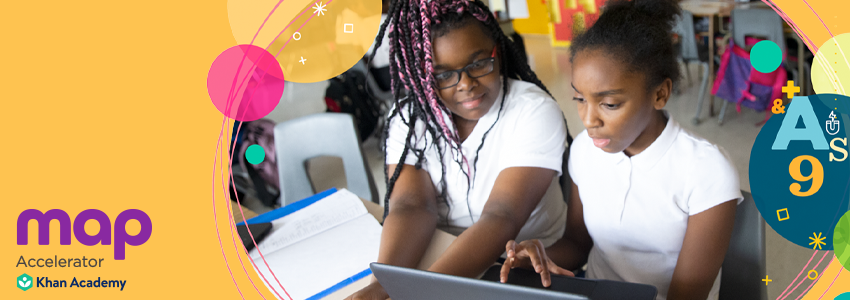
As a math teacher, I had some lightbulb moments when I watched the recent NWEA webinar “Supercharge math confidence (for teachers and students) with MAP Accelerator.” And I’ll admit it, as a MAP Accelerator fan, I didn’t expect to learn anything new.
Is that too honest? Well, blame Nick Joe’s webinar invitation: “I want to challenge you to answer honestly instead of answering correctly.” He spoke the truth when he said that educators often know the right answer, but we are seldom invited to share the honest one. The honest one, it turns out, is that our math learners need support and we, as educators, desperately want to give it to them.
As a professional learning consultant, Nick makes sure NWEA professional learning emulates good teaching: it listens more than it talks, it adjusts the curriculum based on learner feedback, and it offers differentiated approaches. He’s also a veteran math teacher whose fandom over MAP Accelerator rivals only my own. So while I watched the webinar, I remained impressed with MAP Accelerator, but I didn’t expect to have quite as many professional learning aha moments as I did. Before I share them, let me recap why I love MAP Accelerator.
What makes MAP Accelerator great
Math teachers deserve a tool that offers focused math support to their students. And that’s exactly what MAP Accelerator does. Here’s what else I love about it:
- It’s personalized and efficient. MAP Accelerator takes a student’s MAP Growth scores and sets kids on a personalized learning pathway, powered by Khan Academy math activities, to level up their skillsets. Our research shows that just 30 minutes of active learning time a week leads to big gains in math for students.
- It’s engaging and easy to use. With MAP Accelerator, teachers are no longer alone in engaging 35+ students with different needs. Instead, kids in grades 3–8 are automatically more engaged because the learning activities they see are exactly what they need. At the same time, we teachers get back time to plan grade-level instruction.
- Algebra and geometry are included. Algebra I and geometry content is supported by MAP Accelerator.
- It puts MAP Growth data to work. The truth is, learning to use MAP Growth data is a skill many teachers know they need, yet a lot of us feel daunted by just the thought of it. MAP Accelerator easily pulls MAP Growth scores for you and uses them to adjust students’ individualized pathways. Boom. Your MAP Growth data is now working for you.
Knowing how to use assessment data can be challenging
Let’s hang out with the truth from that last bullet a minute: learning to use MAP Growth data is daunting. We all know assessment is essential, yet teachers also know that time spent assessing is time away from learning. Why sacrifice that time if we can’t use that data?
Nick invited participants to share honestly about this challenge during the webinar, and participants did just that. “I certainly think this is where my school struggles,” one said. “Most teachers keep chugging along,” another added. “Our teachers struggle with how to do this,” someone confessed.
Then someone said we are “working toward it.” I wanted to shout, “Yes, you are!” Nick spoke to my teacher soul when he explained the ways NWEA is supporting educators in their journey toward becoming not only better at data—but better all around.
Professional learning can help
It was at this point in the webinar that I started having my lightbulb moments about what professional learning should be (and, spoiler alert: can be).
- Professional learning should be tailor-made. Teachers and administrators. Veterans and first-years. MAP newbies and MAP wizards. We all have different needs. I love how our MAP Accelerator professional learning offerings have different pathways for teachers and leaders. If our students deserve differentiated instruction, we do, too!
- Professional learning should be holistic. We math teachers absolutely want to learn how to understand and implement our data. We also want to learn how to be better math teachers. I felt like Nick was reading my teacher diary when he said that sometimes, we just need to be students and truly demystify division with fractions. Not only can NWEA support your MAP Growth and MAP Accelerator journey, but our math-focused professional learning is designed to support educators at the content level.
- Professional learning should be honest. It should be led by folks who are there not to provide the right answers, but the honest ones. As our partners in education, you show up with honesty. I’m proud to say that we do, too.
Learn more
For more from Nick about being the best math teacher you can be, check out our podcast. I interviewed Nick for a summer episode of The Continuing Educator, and we had an incredible conversation about improvisation, divesting your teacher ego, and the ways we can use comedy in the classroom to help kids learn.
To watch “Supercharge math confidence (for teachers and students) with MAP Accelerator” in its entirety, head to our website. Eager to ask your administrator to bring an NWEA professional learning workshop to your school? Send them a link to our professional learning info page.







